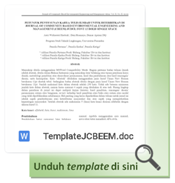COMMUNITY-BASED ORGANIC WASTE PROCESSING USING BSF MAGGOT BIOCONVERSION
DOI:
https://doi.org/10.23969/jcbeem.v5i2.4445Keywords:
Bioconversion, BSF Maggot, Organic wasteAbstract
Organic waste is the largest composition of waste generated by the people of Indonesia, which is around 50-60%. This type of waste, especially food waste, is easy to smell if it is stored for too long so that it has the potential to pollute the environment. On the other hand, organic waste has good nutrients that can be generated, including through BSF (Black Soldier Fly) maggot bioconversion treatment. The BSF maggot bioconversion method is a method of processing organic waste which is carried out by converting organic matter into other products that are useful and have added value by utilizing biological processes from microorganisms and enzymes. Organic waste treatment with this method is generally carried out on a community-based basis and is integrated with the development of agriculture, fisheries and animal husbandry, because maggot cultivation produces commodities of economic value such as compost and maggot larvae. Compost contains very good nutrients so that it can be used for organic farming and maggot contains high protein that can be used for animal feed and fisheries. The implementation of this program was piloted in the boarding school community, namely the Az-Zakaria Islamic Boarding School which is managed by the Az-Zakaria Islamic Education Foundation (YPI) in Sindangbarang Village, Jalaksana District, Kuningan Regency. The result of this implementation is the formation of a new group of entrepreneurs engaged in the cultivation and utilization of BSF maggots.
Downloads
References
Leong, S.Y., Kutty, S.R.M., Malakahmad, A., Tan, C.K. (2016). Feasibility Study of Biodiesel Production Using Lipids of Hermetia illucens Larva Fed With Organic Waste. Waste Manage. 47: 84-90.
Liu, C., Wang, C., Yao, H. (2019). Comprehensive Resource Utilization of Waste Using the Black Soldier Fly (Hermetia illucens (L.)). Diptera: Stratiomyidae. Animals 2019, 9, 349.
Nguyen, T.T.X., Tomberlin, J.K., Vanlaerhoven, S., (2015). Ability Of Black Soldier Fly (Diptera: Stratiomyidae) Larvae To Recycle Food Waste. Environ Entomol. 44(2):406-410. doi:10.1093/ee/nvv002.
Radar Bogor. (2020). Tahun Depan Jawa Barat Diprediksi Alami Krisis Pangan. www.radarbogor.id/2020/12/04/tahun-depan-jawa-barat-diprediksi-alami-krisis pangan/ (diakses 24 Mei 2021).
Rui, M., Sánchez-López, A., Leal, R.S., Martínez-Llorens, S., Oliva-Teles, A., Peres, H. (2017). Black Soldier Fly (Hermetia illucens) Pre-Pupae Meal As A Fish Meal Replacement In Diets For European Seabass (Dicentrarchus labrax). Aquaculture 2017, 476, 79–85.
Satori, Mohamad. 2014. Kajian Potensi Ekonomi Berbasis Sampah untuk Menumbuhkembangkan Ecopreneur dalam Mendukung Tamansari Ecovillage. BPLH Kota Bandung.
Satori, Mohamad et.al (2018). Pengolahan Sampah Organik Rumah Tangga Dengan Metode Bata Terawang. Ethos (Jurnal Penelitian dan Pengabdian Masyarakat): 135-145
Wardhana, A.H. (2016). Black Soldier Fly (Hermetia illucens) as an Alternative Protein Source for Animal Feed. WART














